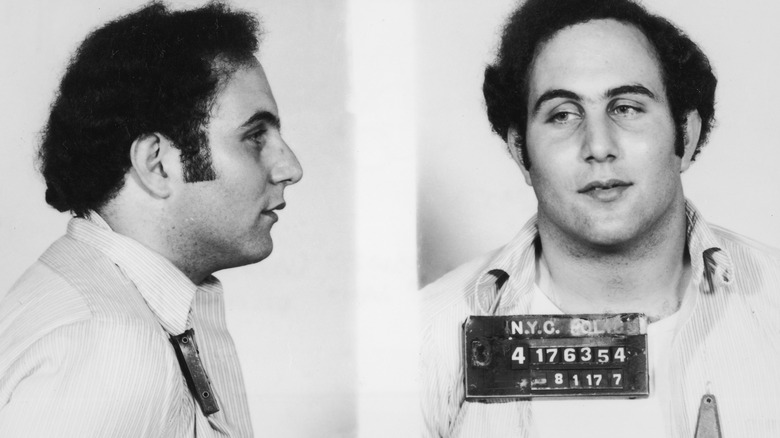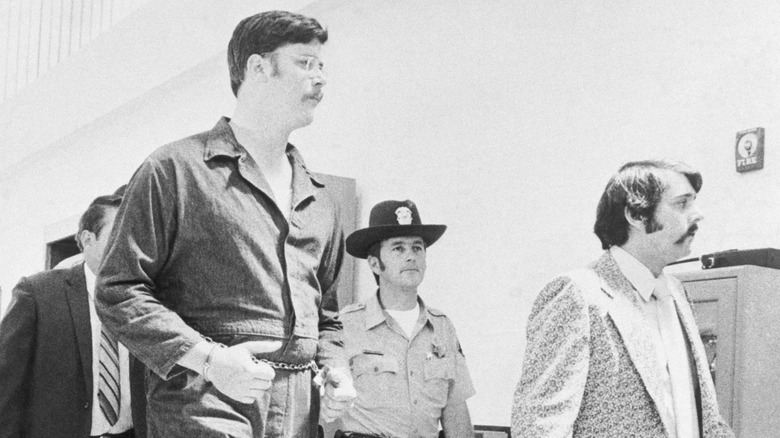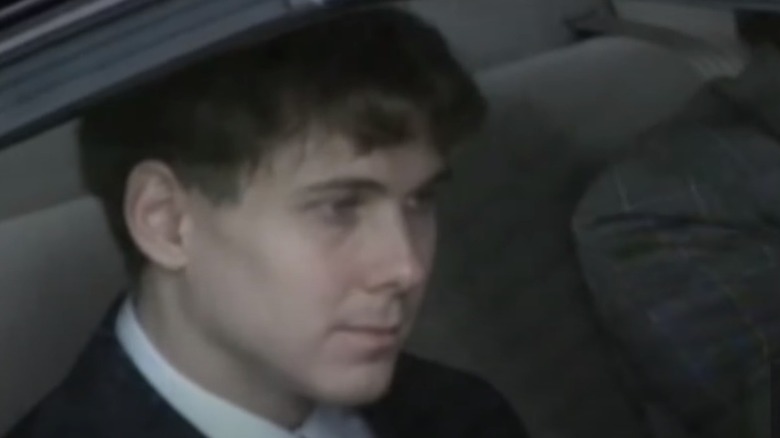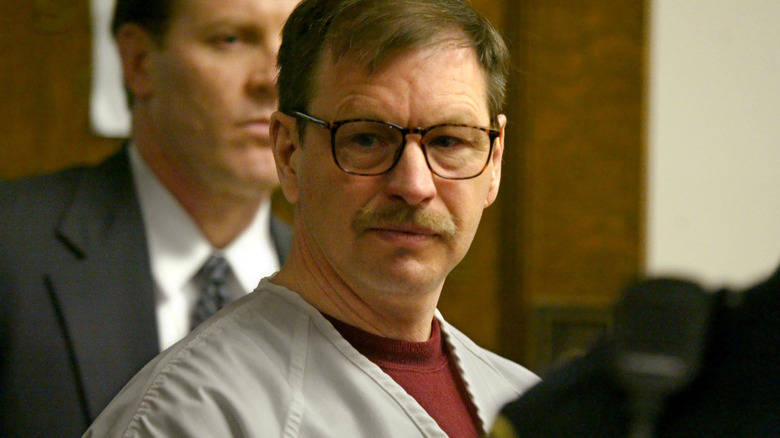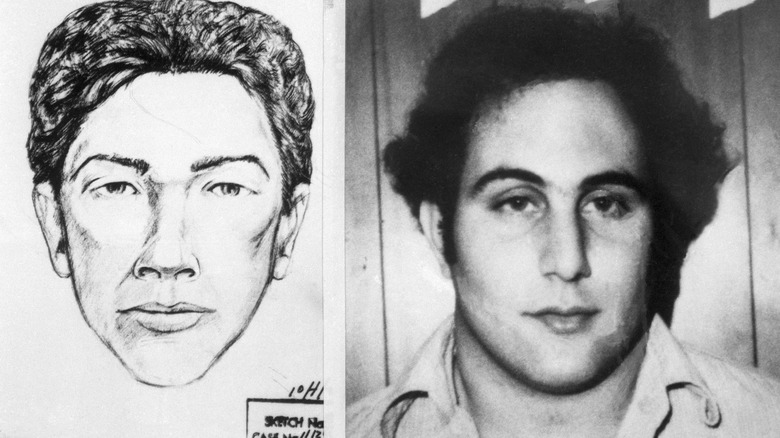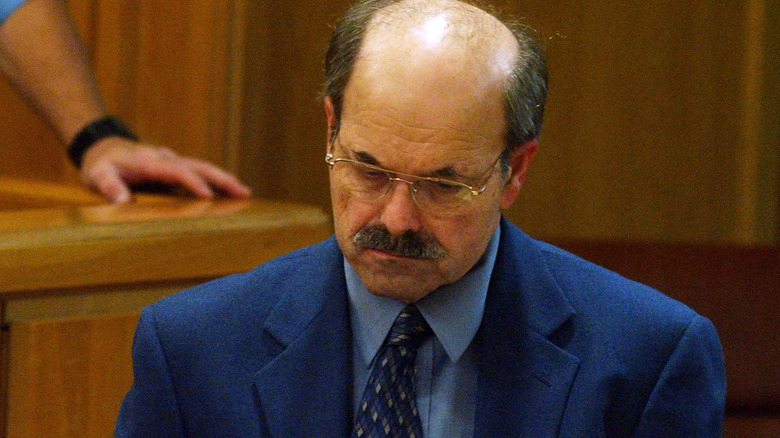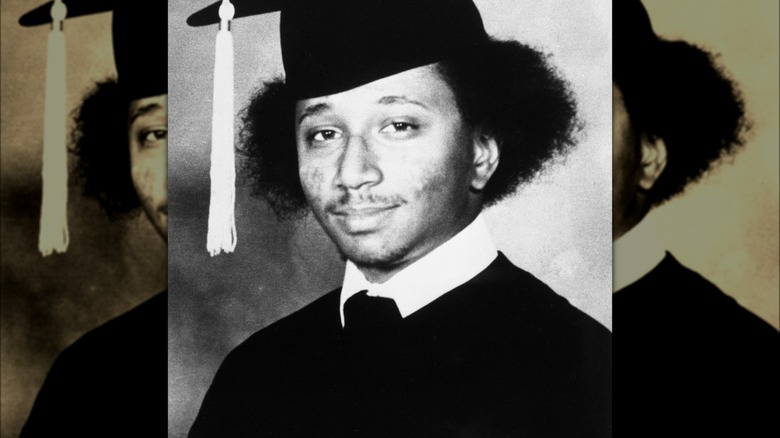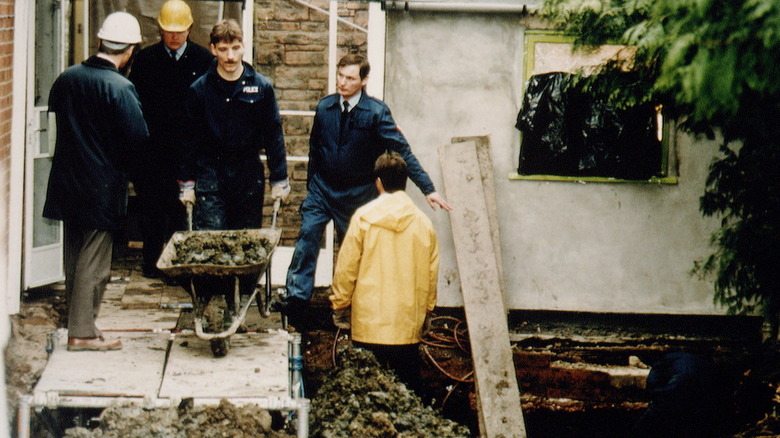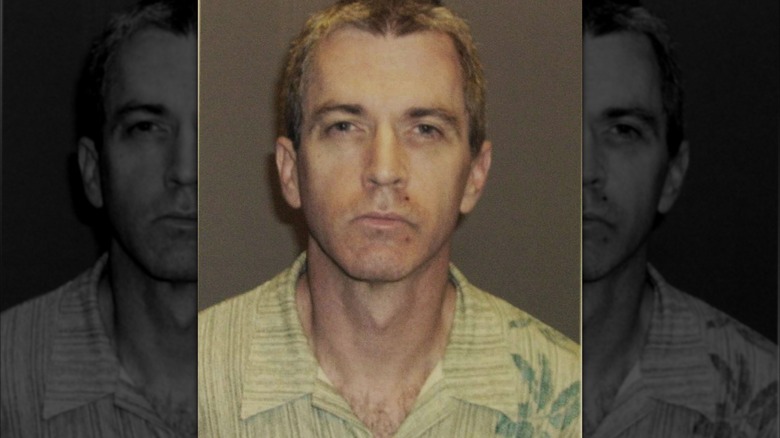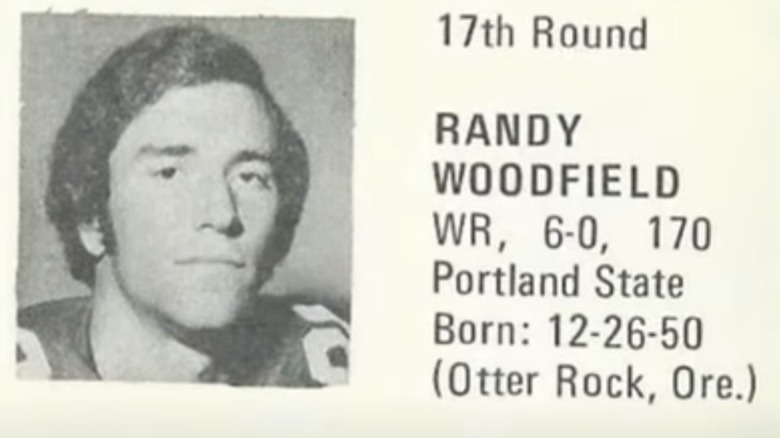Infamous Serial Killers You Forgot Are In Prison
The U.S. can boast about having a lot of things. From amber waves of grain and purple mountain majesties to the best donuts in the world, it's a long list that — fun fact! — also includes serial killers. The U.S. has more serial killers than any other country due to a fascinating list of factors, including sheer size, historical and societal influences like war and economic hardship, and the ability to live side-by-side in cities while remaining strangers. There's also the rise of the so-called celebrity serial killer, and here's the thing: They make headlines, news stories, and made-for-TV movies, but how many notorious serial killers have faded from infamy to a largely forgotten existence behind bars?
Everyone sort of knows about some who have since died. There's Ted Bundy's famous execution, Jeffrey Dahmer's ignominious end at the hands of another inmate, John Wayne Gacy's execution. But what about BTK? The Son of Sam? The Golden State Killer? Edmund Kemper? Are they dead ... or alive?
It's perhaps the Golden State Killer who looms brightest in memories these days, just because of how recently he was apprehended. It wasn't until 2020 that Joseph DeAngelo was convicted and sentenced to life in prison for a series of brutal rapes and murders committed throughout the 1970s and 80s, and given that he was 74 years old at the time, "life" was kind of a hollow punishment. But what about the others? It's kind of shocking just how many infamous serial killers many may have forgotten are still cooling their heels in jail.
The following article includes descriptions of sexual assault, child abuse, and suicide.
Edmund Kemper
It's a pretty eerie fact that the Netflix series "Mindhunter" is based on true events, specifically, interviews with a list of serial killers. One of those killers was the eerily cool, calm, and collected Edmund Kemper, who — as played by the brilliant Cameron Britton — discussed his brutal murders and subsequent dismemberments and necrophilia with the same air as someone might discuss the changing weather. Kemper's real-life killings came to an end when he shot, killed, and dismembered his own mother, before killing a friend of hers and then fleeing.
Kemper confessed to police in April of 1973, and he was pretty open about why he did what he did — including the reveal that he'd killed his mother because he wanted to spare her the pain of his imminent capture. He was 24 years old at the time of his sentencing, and in a bizarre footnote, he had previously killed both his grandparents when he was just 15 years old. He was released at 21, added a few more brutal slayings to his repertoire, and The New York Times reported that after he was handed a life sentence, he politely thanked both the judge and the prosecutor, even shaking the latter's hand.
There was no chance of Kemper getting the death penalty: That wouldn't come into effect until the following year. He was denied parole in 2007 and 2017, noting that he was fine right where he was — the California Medical Facility in Vacaville. He'll be up for parole again in 2024.
Robert Pickton
It sounds like the plot of a Netflix series: A serial killer stalks the streets of Vancouver, selecting victims that he brutally murders and then disposes of with the help of the pigs on his farm. That's the gist of the Robert Pickton case, though, and although he was only charged with 26 murders, he was suspected in as many as 65, going back to 1978. (Many of his victims — confirmed and suspected — were sex workers or Indigenous women, leading to widespread complaints about how these cases were treated by law enforcement.)
As early as 1997, complaints were filed against Pickton — first, by a woman who escaped him and ran for help. In 1999, there were reports of female corpses seen hanging in the slaughterhouse on his property. Still, it wasn't until 2002 that law enforcement was able to get a search warrant based not on corpse sightings, but on rumors of illegal weapons, and when they finally investigated, they found much, much more than a few guns: They seized around 600,000 pieces of evidence and 200,000 DNA samples.
And yes, Pickton is still in jail. In 2023, the families of some of his victims joined forces to try to stop the destruction of evidence in his case, condemning the decision that they claimed would guarantee unsolved cases would remain unsolved, and unidentified victims would never be named. Perhaps even more shocking, Pickton became eligible for day parole in 2024 ... should a hearing rule in his favor.
Paul Bernardo
Paul Bernardo is one half of a serial killer couple, and while his then-wife Karla Homolka was released from prison in 2005, he continues to serve a sentence handed down after his conviction in the brutal murders of 14-year-old Leslie Mahaffy, and 15-year-olds Kristen French and Tammy Homolka — his sister-in-law. The killings captured headlines as the pair were nicknamed the Ken and Barbie Killers, and it was grisly stuff that involved torture, rape, and murder.
Bernardo was sentenced in 1995, and was held at the Kingston Penitentiary. Over the course of the next two decades, he was considered a high-profile target and was assaulted multiple times, although records obtained by the CBC suggest he was never the aggressor. He had a handful of incidents in his record over the years, and when he was transferred to a medium-security facility in 2022, it's safe to say that no one was really happy about it.
Scores of representatives from all levels of the Canadian government condemned the motion, leading Correctional Service representative Anne Kelly to make a statement saying (via the National Post), "The fact that he is at a medium-security institution does not negate the fact that he is a psychopath, and that he committed horrific and unspeakable crimes. ... The punishment is the sentence, and he was given the harshest sentence possible in the Canadian justice system." He was denied parole in 2018, and again in 2021.
Gary Ridgway
Gary Ridgway — popularly known as the Green River Killer — was one of the nation's most prolific serial killers. With 49 confirmed kills, it seems almost unthinkable that the 1980s and 90s-era killer is still in the news in 2024, but he is. That's when it was announced that one of his as yet unidentified set of remains — known for decades only as "Bones 20" — was identified as Tammie Liles, a 16-year-old Seattle resident who was reported missing in 1983. Just weeks before, law enforcement announced the identification of "Bones 17": Lori Anne Razpotnik was 15 when she vanished in 1982.
It was also in 2023 that an NBC News investigation turned up a chilling discovery. Ridgeway was ultimately arrested after a 2001 investigation that had linked him to the case via recent advances in DNA fingerprinting, and while authorities lauded the work done to put him behind bars, it turned out that there was a major piece of evidence — a unique type of industrial paint — that not only connected victims, but Ridgway. Technology existed that was capable of discovering the connection in the 1980s.
In 2020, the Washington State Supreme Court narrowly voted against legislation that would have allowed for the release of thousands of prisoners in an attempt to combat overcrowding and the spread of COVID, with Ridgway's name reported as one of those that fit the criteria for early release. It didn't happen, and Ridgway is still being held at the Washington State Penitentiary.
David Berkowitz
When it comes to the royal court of serial killers, David Berkowitz has a seat at the main table. He dubbed himself the Son of Sam, writing taunting letters to police that included terrifying lines like (via Cosmopolitan), "When father Sam gets drunk, he gets mean. He beats his family. Sometimes he ties me up to the back of the house. Other times he locks me in the garage. Sam loves to drive blood. 'Go out and kill,' commands father Sam."
Berkowitz killed six people in the late 1970s, lighting New York City on fire with fear. His arrest, trial, and sentencing filled the headlines with sensationalistic news, and it was June of 1978 that he was given 25 years to life for each murder. He was 25 at the time, and he's now being held in New York's Shawangunk Correctional Facility.
Like many, Berkowitz discovered religion behind bars, and converted to be an Evangelical Christian. He's also been taking a stand against something strange: Murderabilia. Murderabilia is the sale of items related to violent crimes, and the so-called Son of Sam laws were put in place to stop precisely that. That's had limited impact and was ruled unconstitutional, though, and victim advocate Andy Kahan has reached out to Berkowitz to get his take on the whole thing. For more than 20 years, Kahan and Berkowitz have been working together to identify dealers soliciting materials from serial killers, and end the profiteering. Who would have thought?
Dennis Rader
There's no better example of just how deceiving appearances can be than Dennis Rader. No one — not even his immediate family — suspected that the devoted, church-going family man was the serial killer known as BTK, for "Bind, Torture, Kill." Born in 1945, Rader married in 1971, started killing in 1974, and continued off and on for years, before being arrested in 2005 after sending a series of new letters to authorities. Rader pleaded guilty, was sentenced to 10 life sentences, and is still being held in the El Dorado Correctional Facility.
Rader's daughter, Kerri Rawson, wrote a book about her experiences and, in 2023, visited her father to try to learn the details of his crimes in hopes of closing some of the unsolved cases that still remain. She told The New York Times, "I have always just wanted to help. I wanted access to this stuff when I could handle it, because I knew I could maybe learn more. There were those missing puzzle pieces."
That interview came on the heels of an announcement that Rader's letters and drawings had given authorities the location of some of the trophies he had kept from his victims. Several others had recently come forward to claim they were survivors of BTK, and it's entirely possible that more cases might be solved. How much time there is, it's impossible to tell: Rader, Rawson reported, was a frail, 78-year-old man when she came face-to-face with him for the first time in 18 years.
Wayne Williams
Get a handful of true crime buffs in the same room, and even if they don't agree on much, most will probably agree that "Mindhunter" was a pretty great show. The second season revolved around a case dubbed the Atlanta Child Murders, and it's exactly what it sounds like. In the late 1970s and early 1980s, families in Atlanta lived in fear — particularly those with young sons. At least 28 disappearances were connected with the spree, while law enforcement tried to paint a picture of runaways, or casualties of drug-related conflicts. That went over about as well as could be expected, and kicked off a massive outcry from a terrified, traumatized community.
Atlanta parents banded together, it was largely their advocacy that pushed investigators — including the FBI — to, well, investigate. It wasn't long before authorities settled on 23-year-old Wayne Williams as a suspect, and Williams has consistently maintained his innocence throughout his arrest and trial. It didn't really help in the end: He was convicted and given two life sentences, which he still continues to serve out his sentence in Georgia's Hancock State Prison.
Williams was denied parole in 2019, with another hearing scheduled for 2027. There is a massive footnote to this, though, and that declaration of innocence? Some of the parents of the murdered children believe him. Williams reportedly keeps in touch with some of the victims' families, and there was enough doubt about the case that it was reopened in 2019.
Rosemary West
Among Britain's worst serial killers were a married couple named Fred and Rosemary West. Their story hit headlines in a very Jeffrey Dahmer-esque way, when the remains of nine women were discovered in their Gloucester home (pictured). Together, they were charged with 10 murders, and Fred was charged with 12. Although Rosemary maintained her innocence, she was still convicted on all 10 counts and remains in prison today. Gloucester Live took a look at the case in 2021, and confirmed the 67-year-old West was still being held at Wakefield's New Hall Prison. (Fred died by suicide before his trial.)
They also spoke to a former prison officer who knew Rosemary, and said that although she had a reputation as "Auntie Rose," "... there was something much more calculating going on in her head." That's the same year that authorities made another attempt at finding the remains of one of the couple's suspected victims, 15-year-old Mary Bastholm. She was not found. Other confirmed victims the pair were deemed equally responsible for killing were Charmaine West — Fred's daughter from a previous marriage — and Heather West, Fred and Rosemary's oldest daughter.
Rosemary has popped up in the news a few times, making several claims — in 1996, and again in 2000 — that new evidence would prove her innocence. It has not. She's also claimed that Slade bass player Dave Glover agreed to marry her, forcing him to make an official statement saying that just wasn't true at all.
Charles Cullen
In many cases, people can get to know their coworkers just as well as their immediate family members, and in 2003, Amy Loughren's friendship with a fellow nurse named Charles Cullen came crashing down around her. Law enforcement recruited her to help catch Cullen, and by the time he was convicted three years later, he was definitely linked to 29 murders and suspected in as many as 400.
Loughren consulted on the Jessica Chastain film "The Good Nurse," and told Glamour that before she'd been approached by authorities, she'd had no idea what he was doing, and what he was capable of. "I don't even remember driving home that day," she said. "It was like everything shut down, I completely disassociated from reality because I could not process it. It was such an intense emotion that I couldn't even grasp it."
Cullen had bounced around in between multiple hospitals before being arrested in 2003, charged with using a chemical called digoxin in most of his murders. He pleaded guilty in 2005, was sentenced to 11 life sentences, and today, he remains in New Jersey State Prison.
Randall Woodfield
The story of Randall Woodfield is so strange that it seems like something that has to be fiction ... but, it isn't. Woodfield was drafted by the Green Bay Packers in 1974, and those who knew him recalled a player who was friendly but odd, sociable but just a little bit on the outside. It was perhaps best summed up by PSU quarterback Jon Carey in an interview with Sports Illustrated: "He was a suave, sophisticated fella. Confident in himself, but not to the point of being cocky." Still, Woodfield was cut from the team, and in 1975, he was arrested on robbery charges. Authorities believe that he didn't start killing until 1980 — after his release — and in 1981, he was arrested and charged with being the serial killer that had been terrorizing the northwest's I-5.
Woodfield was convicted on murder charges the same year, and given life plus 90 years (with a few more decades tacked on when more charges came to light.) More victims have been added over the years, including another five confirmed in 2012.
For his part, Woodfield has never confessed to any of the murders that he was charged with. He's currently being held at the Oregon State Penitentiary, and it's unlikely he'll ever have a chance at parole. He was, after all, paroled from his 10-year armed robbery sentence in 1979, just before he escalated to murder. If that seems shocking, it's not: Check out these killers who were released on parole, only to kill again.
Robert Lee Yates
At a glance, Robert Lee Yates looked like a typical, everyday sort of person. He was a military veteran, he was the married father-of-five, they had a perfectly normal life in Spokane, Washington — until, that is, he was arrested for a series of murders that had targeted sex workers and left at least 13 people dead. Yates was actively killing between 1975 and 1998, was arrested in 2000, and when DNA evidence was recovered from his car and definitively linked him to several murders, what more could the prosecution ask for? They got it — in the form of a body that he'd buried in the front yard of his home.
Yates pleaded guilty on the condition that he wouldn't be given the death penalty, but over the years, that's sort of been up in the air. He was actually sentenced to death in 2002 and given an execution date, but the cast got caught in limbo when Yates opted to plead mental illness. That may have been a completely legit defense, but the county prosecutor was quoted as observing (via The Cinemaholic), "I don't think Mr. Yates helps his cause by relying on the fact that he's a necrophiliac."
Yates was still given new hearings, and was still fighting when — in 2018 — the state declared the death penalty unconstitutional. That applied to him, and he's currently being held at the Washington State Penitentiary. The death penalty was off the table, but so is the possibility of parole.
If you or anyone you know needs help with mental health issues, may be the victim of sexual assault, may be the victim of child abuse, has experienced a hate crime, is struggling or in a crisis, contact the relevant resources below:
-
The Crisis Text Line by texting HOME to 741741, call the National Alliance on Mental Illness helpline at 1-800-950-NAMI (6264), or visit the National Institute of Mental Health website.
-
The Rape, Abuse & Incest National Network website or contact RAINN's National Helpline at 1-800-656-HOPE (4673).
-
The Childhelp National Child Abuse Hotline at 1-800-4-A-Child (1-800-422-4453) or contact their live chat services.
-
The VictimConnect Hotline by phone at 1-855-4-VICTIM or by chat for more information or assistance in locating services to help. If you or a loved one are in immediate danger, call 911.
-
Call or text 988 or chat 988lifeline.org
